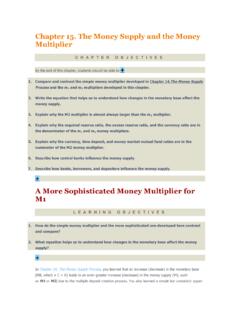Transcription of IMMANUEL KANT’S ETHICAL THEORY RIGHTS AND DUTIES …
1 Saylor URL: Subunit Dr. David Yount, Mesa community College These materials can only be reproduced and distributed for academic and noncommercial purposes Page 1 of 5 IMMANUEL KANT S ETHICAL THEORY RIGHTS AND DUTIES DR. DAVE YOUNT, MESA community COLLEGE I. IMMANUEL KANT (1724-1804) A. THE CATEGORICAL IMPERATIVE: The categorical imperative is the way in which you determine what your DUTIES are, what you should and should not do. It is categorical, because it applies (or is intended to apply) to everyone, without any exceptions, and it is an imperative, since it is a command.
2 So it is a command that applies consistently, to everyone. You might think of the Ten Commandments here, as the kind of thing that he is referring to. There are two formulations (for our purposes - there are actually six in his whole book, Grounding for the Metaphysics of Morals): 1. First Formulation: "Act only on that maxim through which you can at the same time will that it should become a universal law."1 Maxim = a description of action in imperative form. , Help this person in dire need, Don t lie, Don t steal, Steal when you feel like it, Kill others when you re frustrated, are maxims.
3 NOTE: The categorical imperative will make it that you cannot universalize make it a universal moral law that applies to everyone including you to kill others when you re frustrated. So some of these maxims will pass this formulation of the categorical imperative, and some will not. We will cover this in more detail as we continue. 2. Second Formulation: "Act in such a way that you treat humanity, whether in your own person or in the person of another, always at the same time as an end and never simply as a means."2 Some explanation of the second formulation: a.
4 People (rational beings) are ends in themselves ; non-rational beings (non-human animals) and anything else (chairs, dirt) are things. There are three reasons why we are ends in themselves, according to Kant: (1) People have practical reason (= ability to think about and choose which actions we would like to do, what goals we have, and so on). (2) People have autonomy (Greek: auto-nomos law unto ourselves) we create laws for ourselves we determine our ends through practical reason. Autonomy is roughly equivalent to free will. (3) We human beings have intrinsic value, not mere instrumental value.
5 We are like unique Ming vases, works of art that must be respected. We always have intrinsic value, we may have instrumental value as well (that is, we may be able to help others and get something 1 IMMANUEL Kant, Grounding for the Metaphysics of Morals, translated by James W. Ellington. 3rd edition. Indianapolis: Hackett Publishing Co., 1993, p. 30. 2 IMMANUEL Kant, Grounding for the Metaphysics of Morals, translated by James W. Ellington. 3rd edition. Indianapolis: Hackett Publishing Co., 1993, p. 36. Saylor URL: Subunit Dr.)
6 David Yount, Mesa community College These materials can only be reproduced and distributed for academic and noncommercial purposes Page 2 of 5 out of others). b. What actions fail Kant s test? Those actions that treat people solely as a means. , treating a person solely as an instrument to obtain something for yourself. Slave trades, rape, industrialists ( , sweatshops), lies to further yourself. c. What actions pass Kant s test and are therefore morally permissible? Actions that will routinely pass the test of universalizability: treating people as ends in themselves or both as means and as ends.
7 Treating people only as an end: Treating them with respect, but not necessarily getting any huge benefit from it. EX: not punching students on your way to class. Treating people both as a means and an end: EX: My teaching you - I receive money, you receive an understanding about philosophy and maybe a degree, so we re each treating other as a means; but, we are treating each other with respect while doing this, so we re also treating each other as an end. d. Respect for Rational Beings: Every person, by virtue of his/her humanity ( , rational nature) has an inherent dignity. From this, we need to respect ourselves and others too.
8 If we all did this, we'd have what Kant calls a Kingdom of Ends . 3. Comparison of Categorical Imperative v. Golden Rule: Suppose the Golden Rule = Do unto others as you would have them do unto you. The Golden Rule is more permissible/lenient than Kant's categorical imperative because the Golden Rule relativizes its principle to passions, inclinations, etc. In other words, Kant's THEORY goes above and beyond the Golden Rule, so you should not think of them as being equivalent (though his view is certainly related to it). B. PERFECT DUTIES V. IMPERFECT DUTIES : 1. Perfect DUTIES : DUTIES that require that we do or abstain from certain acts.
9 There are no legitimate exceptions to a perfect duty. Notable perfect DUTIES : Duty to tell the truth, keep our promises, and refrain from committing suicide. It s intrinsically wrong to do the opposite of these. No matter how beneficial the consequences, these actions are strictly impermissible. We violate perfect DUTIES when we treat someone simply as am means. [NOTES: (1) You can't play these DUTIES off of one another - you can't promise to lie, promise to commit suicide, or say you'll commit suicide and then say you can't lie, so you need to carry it out! All of these would be contrary to reason, just as using your will to destroy your will is self-contradictory.]
10 (2) It's not breaking a promise to not have any way of fulfilling a promise: For instance, I promise my son to play football this weekend, but I break my leg between now and then. I am physically unable to fulfill the promise, so I m not morally wrong to not play football. The only way in which it WOULD be immoral for me to not play football with the broken leg, is if I intentionally broke Saylor URL: Subunit Dr. David Yount, Mesa community College These materials can only be reproduced and distributed for academic and noncommercial purposes Page 3 of 5 my leg in order to not fulfill the promise!
















